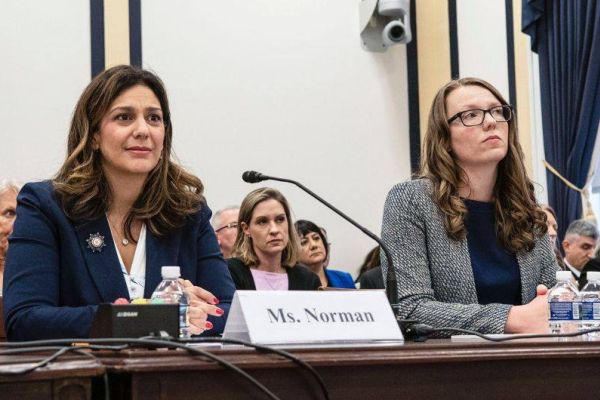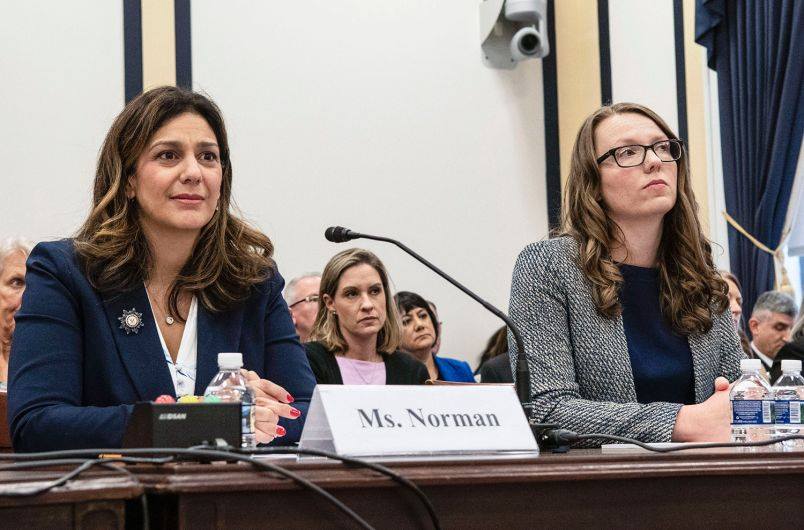
2023 Update: EFMP Standardization
| Advocacy, EFMP, Featured Article
The Department of Defense released the new Exceptional Family Member Program (EFMP) Instruction, DoDI 1315.19 on June 23, 2023. This instruction is the EFMP standardization plan we have been waiting for!
Military EFMP families have expressed dissatisfaction with the EFMP program for years, which led to Congress convening a House Armed Services Committee Military Personnel EFMP Hearing on February 5, 2020. Feeling underrepresented and underserved, countless military families came to the Capitol that day to be heard. They shared stories that identified insufficient availability and quality of medical care and special education. Shortly after, Congress mandated EFMP standardization across service branches and called for improvements to EFMP in the 2021 National Defense Authorization Act (NDAA). Just shy of two and half years later, with much hard work and negotiations among DoD and service branch leaders, the DoD Instruction (DoDI) has arrived.

Since its release, Partners in PROMISE reviewed this update, comparing it to previous policies and instructions pertaining to EFMP; including the 2017 DoDi instruction, the 2021 DoD’s report to Congress on the Implementation of Section 582 of the 2021 NDAA, and the 2021 NDAA. We also compared these updates to the feedback we have received from the thousands of military families who have shared their experiences via our annual EFMP/special education surveys.
Main takeaway: the update is underwhelming. While we had hoped standardization would minimize Program variability, this instruction still puts many important decisions back in the hands of individual service branches.
Although this is a huge leap forward for EFMP, this update still fails to address the intersections of EFMP and special education. EFMP families want clear, consistent special education support and resources across DoD and service branches. This instruction falls short of delivering standardized processes between the EFMP offices and School Liaison Program. Additionally, Sec. 589G of the 2021 NDAA mandates reporting and collection of special education disputes and their outcomes. This requirement was not included in this revision. Considering half of the 2020 EFMP Congressional Hearing focused on special education challenges, as did past NDAAs and Presidential Budget Requests, we expected more.
That said, this is a big step in the right direction. Our military community knows the importance of military family quality of life when it comes to military recruitment, readiness and retention. As mentioned by DoD senior leaders, more enhancements are needed. We are hopeful that the Office of Special Needs will continue to provide data-informed guidance to update this instruction in the months and years to come. This further guidance will establish a missing partnership between the people being served, those making policy and those implementing the policy. We all want to see improvements that will make a real difference for EFMP families.
Positive EFMP Standardization Improvements:
- Standardized enrollment and disenrollment procedures (although age of majority should be defined as many military children remain dependents past the age of 18)
- DoD Early Intervention service providers are now required to inform service members about EFMP program
- Improved training of key EFMP staff on relevant topics like Supplemental Security Income (SSI) and Medicaid
- Increased rights are afforded to service members regarding assignment notification and the ability to request a second review of orders within 14 business days, with a final duty assignment notification due from the military personnel office within 30 calendar days.
- Formalized warm handoff process during Permanent Change of Station (PCS) moves (not clear who initiates contact with losing Family Support Office)
- Annual EFMP case manager check-ins with each EFMP family
- Respite Care: Although some branches may experience a reduction in hours, this update provides the ability to request additional respite care hours if needed.
- Increased communication via a DoD Coordinating Committee that meets biannually to review implementation of policies, procedures and programs (However, we are concerned that meeting information is not publicly available.)
- Respite care program covers adult dependents (need more information on eligibility criteria and the type of coverage available)
Concerning EFMP Standardization Updates:
- Annual collection and reporting of the number of special education disputes filed and the outcome or disposition of the disputes was mandated per 2021 NDAA Sec. 589G. This was not mentioned in the EFMP DoDi under reporting requirements, yet the 2021 NDAA explicitly states: “Records and reports of case managers and navigators under the Exceptional Family Member Program of the Department of Defense.”
- It is unclear who is responsible for determining if appropriate special education resources are available in locations within the Continental United States (CONUS):
- The Assistant Secretary of Defense for Health Affairs (ASD(HA)) is responsible for establishing guidelines for maintaining accurate information on the availability of medical services by location to assist designated EFMP staff complete the assignment coordination process.
- Department of Defense Education Activity (DoDEA) reviews OCONUS (overseas) and DoDEA-enrolled students but not public schools.
- The designated EFMP staff that conducts assignment coordination may be the ones to verify the availability of special education resources, but this instruction does not provide a mechanism or metric by which to do so. This is a problem for EFMP members who need specialized special education services that may not be available (Deaf/HOH community, specific learning disabilities, etc.).
- Standardized rubric for respite care to be implemented by the end of fiscal year 2024. Centered on age-specific level of need (LoN), standard allotments of hours of respite care will be offered monthly. LoN 3 with moderate needs (trained support) are eligible for 20 hours per month of respite care and LoN 4 with severe needs (nursing care services) are eligible for 32 hours per month. LoN 1 and LoN 2 are not eligible for EFMP Respite Care Services. This could amount to an increase in care for some branches (i.e., Air Force) but a reduction for others (Navy).
- There was no discussion of family separation allowance when the service member is required to travel for the next set of orders for the service’s mission. This was mandated in Sec. 582(b)(8) of the 2021 NDAA to support military families where the service member’s dependent(s) is/are unable to accompany the member to the duty station for certified medical reasons.
- Lack of required educational reporting metrics. Without understanding how military families are doing it is more difficult to be effective in helping them through this Program.
- Lack of standardization, monitoring and evaluation of the special education legal services programs. Currently, all branches offer special education attorneys but the experiences reported by families vary greatly.
- No acknowledgment of adults in the EFMP program when mentioning the training of key EFMP staff. According to our not yet released report outlining the experiences of EFMP adults, adults in the program do not believe it has been designed with them in mind.
- No discussion on whether EFMP family support services and personnel can attend IEP meetings. There is a vague reference to their ability to “offer assistance.” Unless explicitly given the permission and authority to help, providers may not feel it is within their purview to help, despite being trained to do so.
Open Questions:
- Not clear how ASD(HA) will train purchased care (Tricare Select) providers about the EFMP program. Our past three years of surveys show that many EFMP families are first told they are required to enroll in EFMP by a medical professional (unpublished finding). A lack of training may result in under-enrollment for families who do not use Tricare Prime.
- DoDEA may request reimbursement from the sending military service when there is failure to coordinate an overseas assignment with DoDEA that results in the assignment of the service member to an overseas location when DoDEA does not have the staffing allocations or resources and incurs expenses “beyond normal operations” to provide special education services pursuant to the child’s individualized education program (IEP). There is no definition of what DoDEA considers “beyond normal operations.” This can lead to conflict of what special education staff are required to provide and without providing clarity, could result in inappropriate charges to service branches.
- When identifying a special medical need for enrollment, there is no definition of “intensive mental health services.” If additional clarity is not provided, this could prove problematic for both the military health system and purchased care providers.
- ADHD & comorbidity. This new instruction does not require enrollment for those with ADHD alone, only when it appears alongside another eligible diagnosis (published reports show that 60 – 100% of those diagnosed with ADHD have a comorbid diagnosis). This is both positive and negative.
- It will minimize the paperwork required of families by not requiring them to enroll and will minimize the burden placed on assignment coordination by reducing the total number of enrollees.
- This may accidentally incentivize families to not seek the help they or their children need to avoid being flagged for EFMP enrollment that has a perceived relationship with negative career implications.
- The Family Support Office communication plan is unclear. First, there is no timeline for how soon after a PCS they are required to contact an EFMP family. Second, the Family Support Office is directed to communicate with the service member who may not be available to coordinate EFMP care and services (during deployment, TAD, etc.). We suggest extending this communication to allow the Family Support Office to contact both parents.
- There is discussion of collaboration between the EFM and School Liaison Programs but it is not clear who takes lead in special education issues or when conducting training
- Despite being mandated in the 2021 NDAA, there is no family advisory organization cross-collaboration effort mentioned. Because special education and special medical needs force the military community to rely upon these entities, it is essential that EFMP collaborate with them on an ongoing and intentional basis. There is only mention of the Advisory Panel consisting of 7 military families with special needs. Because of the vast diversity in lived experience across service branches and represented disabilities, the greater the collaborative effort, the more likely the program will yield positive outcomes for EFMP families.
While we had hoped standardization would minimize military service variability, we are hopeful that each branch takes the opportunity to offer much-needed clarification as they write their own instructions. Because at the end of the day, all EFMP families want is for the program to add value, not confusion.
Do you also have questions about the new EFMP standardization policy? Let us know at info@partnersinpromise.org. Partners in PROMISE is ready to collaborate with our community and leaders to ensure that EFMP families receive the support they have asked for and need.





Leave a Reply